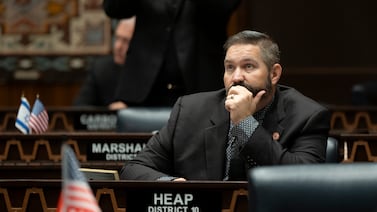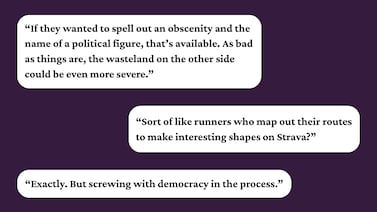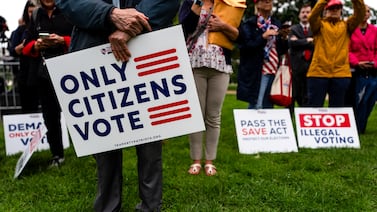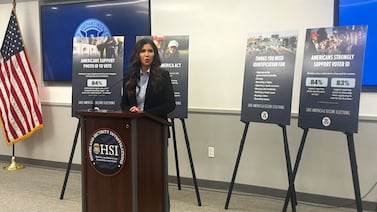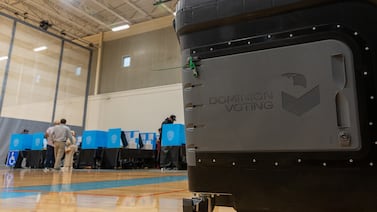Votebeat is a nonprofit news organization reporting on voting access and election administration across the U.S. Sign up for Votebeat Michigan’s free newsletter here.
In a letter to U.S. Attorney General Pam Bondi last week, Michigan Republicans asked the federal government to provide “comprehensive oversight” of the state’s 2026 election.
But the letter doesn’t specify what “comprehensive oversight” means. And it’s not clear that the people who signed the letter agree on the meaning either.
A total of 22 Republican state legislators from both the Senate and the House signed on to the letter, including Senate Minority Leader Aric Nesbitt, Sen. Ruth Johnson — a former Michigan secretary of state — and Rep. Rachelle Smit, who leads the House Election Integrity Committee.
The letter asks the U.S. Justice Department to “deploy official election monitors and provide comprehensive oversight for Michigan’s 2026 primary and general elections.” It cites a number of concerns about Secretary of State Jocelyn Benson’s administration of the election, from the fact that she is running for governor in the 2026 election to her alleged violations of election law.
It is not unusual for secretaries of state to oversee elections they are candidates in. Benson ran the 2022 election that won her a second term, for instance, and Johnson oversaw two separate elections as secretary in which she was also on the ballot. In Michigan, while the secretary of state sets rules and regulations, it is local clerks who typically work with voters more directly, creating a layer of separation between the state’s highest election official and the voters who may or may not be supporting them.
It’s not clear if the Justice Department will take the matter on, but Johnson told Votebeat on Thursday that department officials were already meeting on the request. She said she didn’t know who specifically was involved, and a spokesperson for the department did not respond to a request for comment.
Nebulous views of ‘oversight’
The first part of the Republicans’ request — federal election monitors — isn’t unusual. Monitors watch polling places and vote-counting centers to ensure workers are following processes appropriately. Under President Joe Biden, the Justice Department sent monitors to 27 states in the 2024 general election, including Michigan, and sent monitors for Michigan’s primary election as well. Under President Donald Trump, it sent monitors to California and New Jersey earlier this month after similar requests from members of the GOP in both states, but those monitors were uninvasive and may not have visited certain jurisdictions at all.
“Comprehensive oversight,” though, is a more abstract idea.
To Johnson, oversight in 2026 would be “something that has to be worked out, because you always have to balance everything.” In an interview with Votebeat, she did not go into specifics about what type of intervention she might welcome in Michigan, although she offered one example of something she hopes federal involvement could accomplish: ensuring people don’t vote twice.
That’s already rare in Michigan. Attorney General Dana Nessel, a Democrat, pursued charges against several people in an investigation of double voting last year. Charges were dropped against most, while one was sentenced to probation this year.
But a 2022 statewide audit found that, out of more than 11.7 million votes cast from May 2019 to March 2021, 99.99% were not duplicate votes.
Nesbitt didn’t offer much detail about what federal oversight could look like, either.
“We aren’t leaving any options off the table,” he said in an emailed statement. “The level of federal intervention in Michigan’s election is going to depend entirely on Jocelyn Benson’s willingness to cooperate with the DOJ and follow the law. I’m confident the DOJ will do whatever is necessary to ensure our next election is free of any manipulation.”
Nesbitt said that Benson “should welcome DOJ oversight” if elections are as secure as she claims. Johnson, meanwhile, said she would primarily like to see oversight from someone independent.
Johnson argued that circumstances are different from when she was secretary of state and administering elections in 2014 and 2018. “I was nonpartisan in every single way,” she said. “I got in trouble with some people in my own party because of it.” Benson, she said, has not been the same.
The Michigan Department of State argues that isn’t true. Elections in Michigan “are among the most transparent, secure and accessible in the nation,” Angela Benander, a spokesperson for MDOS, said after the letter was released last week.
“Next year’s election will be no different,” Benander continued. “Yet by pouring gasoline on our democracy and asking the DOJ to light a match, these lawmakers ignore these truths. They instead use dangerous, false rhetoric to encourage President Trump to illegally interfere in our state’s ability to hold fair and free elections.”
Federal intervention has few precedents
Experts say the federal government’s ability to intervene in elections is limited. The Constitution is very clear, for example, that states get to establish “the times, places and manner” of elections.
Historically, when the federal government has gotten involved in elections, it has usually been through legislation. During Reconstruction, for instance, Congress passed a series of Enforcement Acts that made it a federal crime to interfere with elections. However, that was at a time when Ku Klux Klan members were using violence to prevent Black voters from casting ballots — a radically different circumstance than the ongoing lawsuits and alleged conflicts of interest Benson faces today.
The timing of the letter is also unusual, said David Becker, an election lawyer who worked in the Justice Department’s Civil Rights Division and now leads the nonprofit Center for Election Innovation & Research — the general election is nearly a full year away.
“I don’t know of a single instance in all of DOJ history where a jurisdiction that wasn’t previously monitored had monitors assigned more than a few weeks before,” he said.
Hayley Harding is a reporter for Votebeat based in Michigan. Contact Hayley at hharding@votebeat.org.


